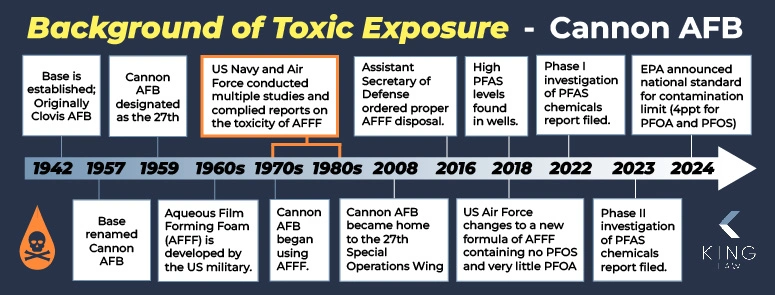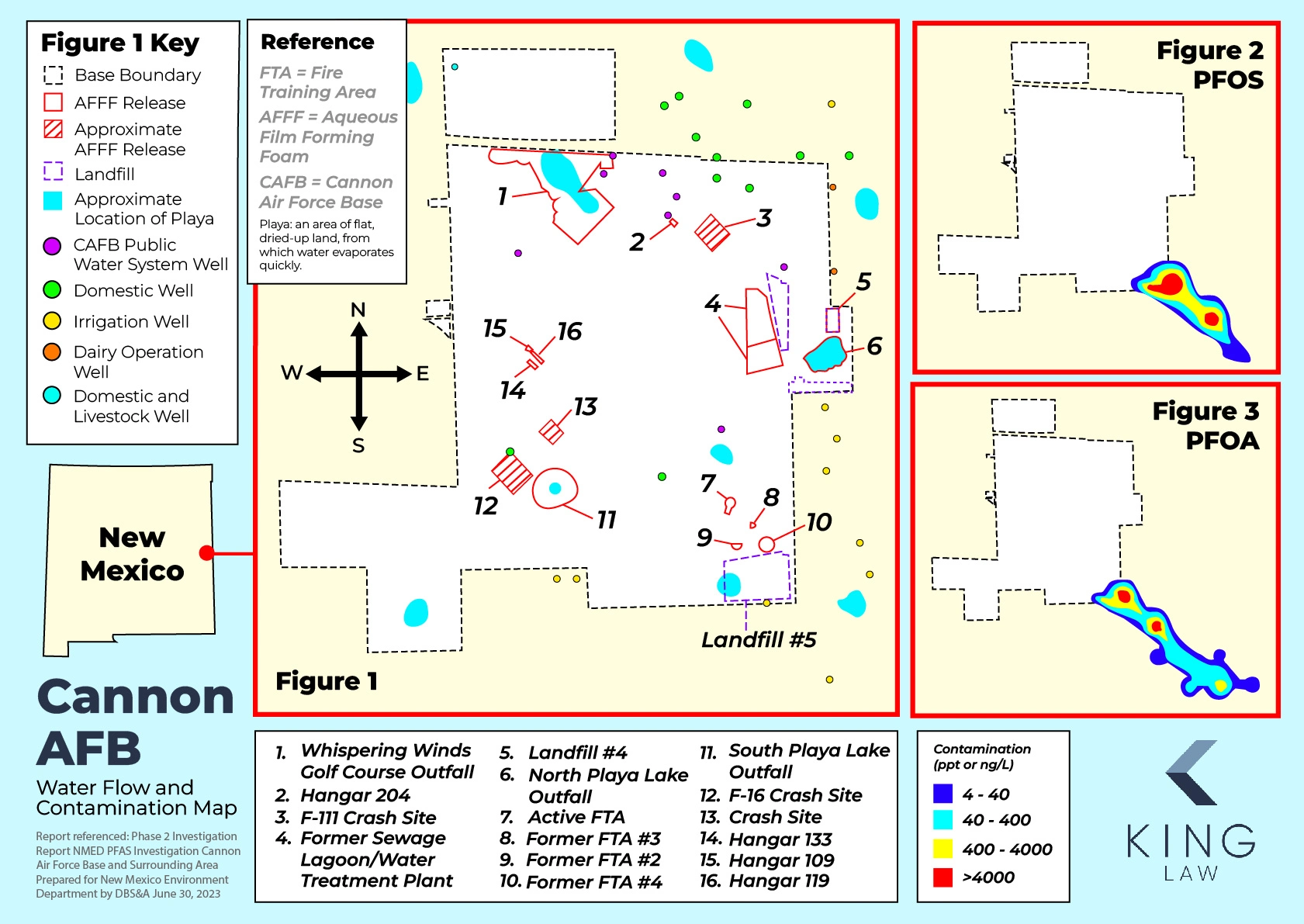
Cannon AFB Water Contamination Lawsuit Overview
Cannon Air Force Base is located near the Texas Panhandle in eastern New Mexico. The base is the Western Home of America’s Air Commandos. Private well testing at the base shows that there may be significant contamination in the groundwater and drinking water.
Per- and poly-fluoroalkyl substances (PFAS) were detected as early as 2018 in the water at the base. PFAS are considered “forever chemicals” that are dangerous to humans and the environment. It is alleged that the military’s use of aqueous film-forming foam (AFFF), which contains PFAS, may have caused significant runoff into nearby soil and groundwater, contaminating the surrounding area.
Individuals who were stationed at Cannon Air Force Base and subsequently diagnosed with a PFAS-related condition may be entitled to compensation. At King Law, our legal team has extensive experience working with service members and their families to secure compensation in a water contamination lawsuit. Contact our office today to schedule your free, no-obligation consultation.
Cannon AFB Water Contamination Lawsuit Updates
April 21, 2024: New Report Details PFAS Contamination Sources at Cannon Air Force Base
April 9, 2024: Cannon Air Force Base Faces Legal and Environmental Challenges Amid Contamination Cleanup Efforts
Cannon Air Force Base is at the epicenter of the military base contamination problem in the United States. A neighboring dairy farm had to euthanize 3,600 cows, valued at nearly $6,000,000. The federal government has said they are immune from the lawsuit brought by the farm’s owners because the complaint does not allege a violation of law. The case is pending in United States Federal Court in the Eastern District of North Carolina before the Honorable Richard Gergel. Now, Cannon AFB is the location of a study by the United States Army Corps of Engineers, Air Force Civil Engineer Center, and government contractors aimed at cleaning up contaminated military bases. Colonel Jeremy Bergin declined to establish a community Advisory Board.
April 2024: Investigations continue into health conditions and other adverse effects of PFAS exposure at Cannon Air Force Base.
May 2023: Cannon Air Force Base announces the formation of a Restoration Advisory Board to be made of community members, local and state regulators, and the Environmental Protection Agency to help remedy the water contamination at the site.
June 2022: Phase 1 investigation report filed indicating significant PFAS contamination and initiating a remedial investigation for clean-up efforts.
September 2020: New Mexico reaches a $250,000 settlement with Cannon Air Force Base over violations of state environmental groundwater permitting laws.
January 2019: An update on the water contamination at Cannon Air Force Base provided by the New Mexico Environment Department indicates that a plume of groundwater extending in a 2 ½ mile radius around the base shows levels of PFAS as well as in wells supplying drinking water to nearby residents and a dairy farm.
October 2018: Cannon Air Force Base notifies the New Mexico Department of Health (NMDOH) that Per- and Poly-Fluoroalkyl Substances (PFAS), chemicals associated with fire-fighting foams, have been detected in the groundwater.
On this page:
Background of Toxic Exposure at Cannon Air Force Base
Cannon AFB Water Contamination Map
Contaminants Found in Cannon AFB’s Drinking Water
Current Water Quality at Cannon Air Force Base
Health Risks Linked to Cannon AFB’s Water
Eligibility Criteria for Cannon AFB Water Contamination Lawsuit
Cannon AFB Water Contamination Settlement Amounts
How to File a Cannon AFB Water Contamination Lawsuit
Statute of Limitations for Cannon AFB Water Contamination Claims
Background of Toxic Exposure at Cannon Air Force Base
Cannon Air Force Base is a military installation located in eastern New Mexico. It sits near the Texas Panhandle and serves over 5,000 active duty personnel. The base was originally named Clovis Army Air Base in 1942 for the nearby town. However, by 1947, the then-named Clovis Army Air Field was inactivated.
On June 8, 1957, it was renamed Cannon Air Force Base for General John K. Cannon, a former commander of the Tactical Air Command. Today, the installation is home to the 27th Special Operations Wing.
In 2018, Cannon Air Force Base notified the New Mexico Environment Department (NMED), the New Mexico Department of Health (NMDOH), and the New Mexico Department of Agriculture (NMED) that sampling from multiple wells on and off base showed high levels of per- and poly-fluoroalkyl substances (PFAS). The contaminated groundwater at the base is believed to pose significant health risks to humans and animals.

Cannon AFB Water Contamination Map

According to an environmental study, the most significant sources of PFAS at Cannon Air Force Base come from the “former sewage lagoons and the North Playa Lake on the east side of Cannon AFB.” Additional areas of concern at the installation include the firefighter training areas and Landfill No. 5. Multiple wells on and off base showed high levels of PFAS when tested.
Contaminants Found in Cannon AFB’s Drinking Water
The primary contaminants detected in drinking water at Cannon Air Force Base are per- and poly-fluoroalkyl substances (PFAS). Sampling in 2018 showed off-base wells with concentrations ranging from 25 to 1,600 nanograms per liter (ng/L) or parts per trillion. More concerning, sampling from on-base monitoring wells indicated PFAS concentrations exceeding 26,000 ng/L.
At the time, the recommendation from the Environmental Protection Agency (EPA) was that PFAS levels at or above 70 parts per trillion were unsafe for human consumption. In March 2023, the EPA announced the proposed National Primary Drinking Water Regulation (NPDWR). Under the new guidelines, the legally enforceable Maximum Contaminant Level (MCL) for PFAS would be 4 parts per trillion with a Maximum Contaminant Level Goal (MCLG) of zero.
Current Water Quality at Cannon Air Force Base
According to a recent report from Cannon Air Force Base, water at the installation met all federal and state primary drinking water regulations. However, any detectable levels of PFAS are dangerous to humans and the environment.
Water Treatment Efforts at Cannon Air Force Base
There are ongoing water treatment efforts at Cannon Air Force Base. In May 2023, the installation announced the formation of a Restoration Advisory Board to help determine the best path forward in dealing with the contamination.
Additionally, Phase II of the New Mexico Environment Department (NMED) PFAS investigation continues. The NMED is also offering free PFAS testing to Clovis residents living near the base and on-base personnel.
Health Risks Linked to Cannon AFB’s Water
PFAS exposure has been linked to a number of significant health risks. Individuals who were stationed at Cannon Air Force Base are strongly encouraged to complete regular health check-ups and engage in screenings to ensure early diagnosis and treatment of PFAS-related conditions.
Health conditions linked to PFAS exposure:
- Kidney cancer
- Testicular cancer
- Fertility issues
- Preeclampsia
- Higher cholesterol levels
- Kidney disease
- Leukemia
- Thyroid disorders
- Changes in immune response
- Liver damage
If you have been diagnosed with a PFAS-related condition after serving at Cannon Air Force Base, it is strongly recommended that you speak to an attorney. An attorney can help provide guidance on filing a water contamination lawsuit.
Eligibility Criteria for Cannon AFB Water Contamination Lawsuit
To file a Cannon Air Force Base water contamination lawsuit, you must meet certain eligibility criteria. The best way to determine if you meet the eligibility criteria is by consulting with an experienced attorney.
Our law firm is currently evaluating cases where individuals have been diagnosed with:
- Kidney Cancer
- Liver Cancer
- Prostate Cancer
- Testicular Cancer
- Thyroid Cancer & Thyroid Disease
- Ulcerative Colitis
Eligibility criteria may include the ability to show proof and duration of exposure. Military orders showing you stationed for at 6 months at Cannon Air Force Base (or other additional bases with PFAS) may be sufficient. You will also need to prove that you received a diagnosis of a PFAS-related condition such as thyroid disease or cancer. Medical records can help prove your injuries.
Cannon AFB Water Contamination Settlement Amounts
Cannon Air Force Base water contamination lawsuits can take several months to a year or more to resolve. Settlement and payout amounts are expected to vary substantially based on the individual circumstances of the case, including the type of injury and ability to prove a nexus between your illness and PFAS exposure from the base.
Settlements are anticipated to range between $30,000 and $500,000. Cases with minor injuries or a weaker proof of connection to the base’s toxic substance may settle for between $30,000 and $75,000. However, individuals with provable injuries such as a cancer diagnosis directly related to the water contamination at Cannon Air Force Base may see settlements exceeding $500,000.
How to File a Cannon AFB Water Contamination Lawsuit
In order to begin a Cannon Air Force Base water contamination lawsuit, you need to consult with an attorney as soon as possible. An attorney will provide guidance on the legal process and will help determine whether you meet the eligibility requirements necessary to file a lawsuit.
Evidence to Support Your Claim:
Military base water contamination lawsuits are based on evidence. Evidence is necessary to prove your claim and to receive compensation. An attorney can help determine what evidence may be necessary to your case and how to collect the documents or testimony.
Evidence that may be used to support your Cannon Air Force Base water contamination lawsuit:
- Medical records
- Military orders (showing proof of service at Cannon Air Force Base and other bases with PFAS for at least 6 months)
- Expert testimony
- Witness testimony
- Environmental studies
- Notes from doctors or specialists
- Prescription information
- Water sampling results
It is important to act quickly if you have been diagnosed with a PFAS-related condition after serving at Cannon Air Force Base. All cases are subject to a state-specific statute of limitations.
Statute of Limitations for Cannon AFB Water Contamination Claims
Under state law, you only have a limited amount of time to file a claim based on water contamination at a military base. The statute of limitations or legal deadline is state-specific. Failure to file within the statute of limitations could result in your claim for compensation being denied.
It is important to know that individual circumstances may extend the statute of limitations. Working with an attorney from the date of diagnosis can help ensure that your case is filed timely.
Cannon AFB Water Contamination Lawyers
Were you diagnosed with a PFAS-related condition after serving at Cannon Air Force Base in New Mexico? At King Law, we work tirelessly to ensure military servicemembers and their families receive the compensation they need after a diagnosis related to PFAS exposure. Contact our office today to schedule a free, no-obligation consultation.

